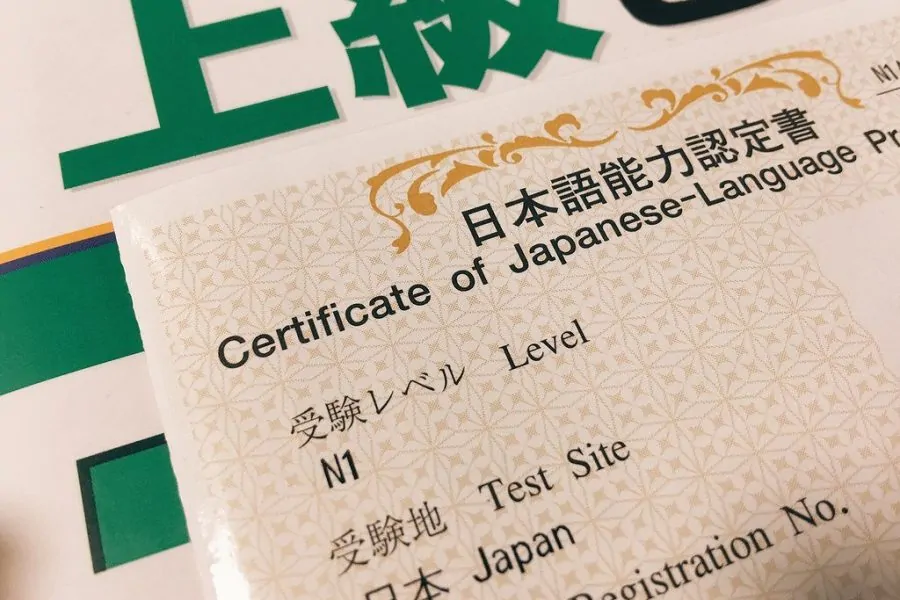This is it. You’ve made up your mind and decided to take the plunge to move to Japan and learn Japanese at a language school.
That’s fantastic! Undoubtedly, the best way to improve your Japanese language skills, especially in a high-context language such as Japanese, is to immerse yourself in it fully.
Not only will you be able to fast-track your learning towards fluency by surrounding yourself with real-life situations to use the language, but you will also find countless opportunities to experience Japanese culture firsthand.
There are many study options available for Japanese language students, from language schools and private tutoring to cultural exchange programs offered by universities.
How you want to study this culture-laden language comes down to your situation – how much time and funds you have available, and ultimately your end goals for learning Japanese.
Each study option has its own set of pros and cons. Regarding flexibility and learning opportunities, attending a language school is one of the best options for learners regardless of their Japanese level.
Keep on reading to find out how to find the perfect Japanese language school suited for your learning needs!
What’s a Language School?
The answer might be obvious, but in a nutshell, a language school is an institution geared to foreigners interested in studying a foreign language through language immersion.

Compared to language courses offered at universities, language schools offer a range of classes and programs designed to teach you a language at a much more rapid and intense pace.
Most classes at a language school are entirely taught in the target language, meaning that you would learn Japanese in Japanese. You’ll be surrounded by an utterly Japanese-speaking environment with continuous exposure to new vocabulary and grammar daily.
Creating an environment that pushes students out of their comfort zone and encourages them to use all of their knowledge of the target language ultimately makes an individual with a strong understanding and use of Japanese.
This might sound daunting to some, particularly to beginners, but it’ll do wonders for accelerating your learning process. Learning a new language has challenges, but there’s nothing more fun than sharing the experience with classmates.
What Types of Courses Do Japanese Language Schools Offer?
With over 400 Japanese language schools dotted throughout Japan, it’s no exaggeration to say there is a vast difference between each institution and its courses.
In general, Japanese language schools provide a variety of courses, differing in length and purpose.
Some will have courses designed to improve conversational fluency and culture classes, while others are geared towards preparing students for the JLPT (Japanese Language Proficiency Test).
Some courses specialize in business Japanese and preparation for entering a Japanese university.
Short Term Japanese Language School Study
Short-term courses are suited for those who want to learn Japanese over a short period, from 1 week to 3 months. They are designed to teach basic to intermediate Japanese and often have a specific focus, such as daily conversation or business Japanese.
These courses are an excellent option for individuals looking for an inexpensive way to learn through language immersion.
Summer courses are particularly popular as they also include plenty of opportunities for students to immerse themselves in Japanese culture.
Summer course schools will often organize tea ceremonies, calligraphy lessons, the chance to wear yukata, and attend a firework festival. Since short-term courses run for three months or less, they are an excellent option for tourists as they don’t require a student visa.
Long Term Japanese Language School Study
Long-term courses can also run from 6 months to 2 years. These intensive classes focus on all aspects of the Japanese language (reading, writing, listening, and speaking).
These Japanese language programs are designed to help students pass the JLPT N1 or N2 examinations and help them enter higher education institutions in Japan. A student visa is required for a long-term course.
If you are already in Japan, you can make the most of the opportunity to go and visit the Japanese school. Ask if you can sit in on some classes to see the teaching style. Some Japanese schools allow interactions with Japanese students so you can practice extensively Japanese language with real native speakers.
The teaching style and class pace vary significantly between schools. Being in the classroom allows you to experience and choose the learning environment that best suits your language learning style.
Costs of a Japanese language school
Tuition fees can vary between language schools, and comparing them can be tricky.
Some schools may offer a short-term course that includes 3 hours of classroom time per day, while others may offer 4 hours or even more.
Some may include the cost of extra-curricular activities, and others may include them as additional costs. Generally, language schools in Tokyo tend to have higher tuition fees than those in smaller cities such as Nagoya or Fukuoka.
On top of the school fees, it’s also essential to look at the accommodation arrangements available. Many schools will offer students enrolled in long-term courses the option to stay in an affordable dormitory, while others may ask students to make their own accommodation arrangements.
With that being said, below is a rough guide to the tuition fees at a Japanese language school in Tokyo:
Costs for a Short-Term Japanese Language School
Short-term courses typically consist of 3 hours of class time every day from Monday to Friday. Short courses are far more expensive than long-term courses per month, but that’s mainly due to their school location. A 1-month course will generally cost from ¥80,000 to ¥150,000.
Most language schools that offer these courses are in Tokyo, one of the most expensive cities in the world. On a more positive note, schools based in Tokyo often attract people from all over the world, so the schools are well equipped with English, Korean, and Chinese-speaking staff to support students.
Costs for a Long-Term Japanese Language School
Long-term courses tend to offer 3 to 5 hours of class time from Monday to Friday. Tuition fees will differ slightly between schools and academies, but a one-year course can generally cost about ¥600,000 or more.
This might be a shock to hear, but tuition price shouldn’t be the main factor when deciding which language school to go to. Rather than just picking out the cheapest school, you should find the right school that will help you achieve your future goals.
Accommodation
When considering which language school to attend, weighing your options for where you’ll be staying is also essential. Most schools will offer at least one of the following:
Homestay – Live with a Japanese family, get an inside look into typical Japanese life, and have plenty of opportunities to hone your Japanese skills.
Shared Dormitory – This is the perfect choice for individuals that prefer to socialize with their peers daily. This is one of the most affordable options.
Independent Living – For those who prefer freedom and independence, renting your apartment might be your answer. This is the ultimate Japanese test, as few real estate agents speak English. You arrange your own housing accommodations.
Language School Location
Most language schools can be found across the major Japanese cities, but one can find some schools in the more rural areas of Japan. Once you have a clear idea of your language goals, the next step is to think about where you want to live.
Tokyo is the first place that comes to mind for many people thinking about studying in Japan. But with its high cost of living and hectic crowds, it might not be the place for everyone.
Yokohama is an excellent option for those that want to experience Japan’s urban city life. It’s just 30 minutes from Tokyo, yet the city has a more laid-back feel and a much lower cost of living.
Yokohama is a city rich in culture and heritage with plenty of beautiful spots, including the fantastic night views of its harbor.
Here are some other Japanese cities that have just as much to offer:
Osaka sits in the heart of the Kansai region, making it the prime location for travel since Kobe, Kyoto, Shiga, and Wakayama are all within a 40 min train ride.
Osaka has a much lower cost of living compared to Tokyo, but it’s still an incredibly vibrant city. People from Osaka are known to be much friendlier and more outgoing than in other regions of Japan, so you might find it easier to make friends with the locals.
Kyoto makes for the perfect compromise between living in a bustling city and the more remote regions of Japan. It is nestled amongst ancient temples and shrines and with a stunning mountainous backdrop; who wouldn’t want to live in the cultural capital of Japan?
Okinawa is a beautiful tropical island located south of Kyushu. Known for its stunning blue waters and unique culture, Okinawa is paradise on earth. If you want to get away from the urban lifestyle and experience a more relaxed and spartan lifestyle, then Okinawa is the place for you!
If you’re still set on moving to Tokyo but have a budget to stick to, finding an affordable place to live is more challenging but possible. Entertainment districts such as Shinjuku and Shibuya are generally more expensive to live in due to their convenience and prime location in the city’s heart.
Some of the most affordable neighborhoods to rent an apartment or find a room at a share house are Nakano, Kamata, and Narimasu.
Choosing The Right Japanese Language School for You
Everyone is different, and when it comes to choosing a Japanese language school, there are certain things you should look for to make sure you get the best experience possible.
Here is a list of essential questions you should ask of the language school you are considering and ensure that you meet your personal goals:
1. Does the language school have a track record for delivering excellence?
New language schools are popping up all the time in Japan. It’s now easier than ever to set up a slick-looking website with catchy slogans and attractive images but don’t be fooled by any of this. I can’t stress enough how important it is to research how long a school has been opening and check its record of success.
A school with a long-standing history will have the experience of understanding the challenges international students face and will be able to support you to achieve your learning goals.
Language schools don’t come cheap, but you should be getting your money’s worth in your education.
2. Is the language school financially stable?
Recently, Japan has been seeing a sudden increase in language schools popping up around the country. There have been reports that several of these schools have been fronts for importing cheap labor.
I cannot stress enough the importance of asking critical questions about an organization’s financial stability before investing a significant portion of its money.
If a school refuses to be open about its financial state, you should take that as a warning sign. Don’t risk investing in a school that could be about to go out of business if they aren’t transparent about how well their business is performing.
3. Does the language school offer courses with unusually low tuition fees?
Schools may offer outrageous discounts or promotions to get more students to enroll in the courses. However, such practices can lead schools to cut corners and ultimately deliver a low-quality experience.
Everyone loves a good deal, but warning bells should go off when a language offers discounts or specials that are too good to be true.
4. Does the school have positive online ratings?
While no organization can achieve a 5-star rating all the time, it’s also essential to note how school representatives respond to negative feedback. It’s always worth having a quick look on review sites such as Language Course what previous students have said about the school. You can also check Reddit.
It would help if you tried to choose a school with an overall high rating on one of these sites. If you can’t find any feedback on a school you are considering, be sure to inquire why this is the case. Does the school seem open to negative feedback and actively address internal issues?
5. Does the school have staff that can speak your language?
This will make your life so much easier in Japan by having someone you can turn to with any questions or concerns you have about daily life in Japan or life as an international student.
Make sure to make the most of the GaijinPot Study Placement Program and Go! Go! Nihon, both of which are free services that can help you find the best language school for you. They also support finding a place to live and a job in Japan!
Are You Ready to Embark on the Adventure of a Lifetime?
Whether you study Japanese at a language school, participate in a cultural exchange program at a Japanese university, or even learn the language while working in Japan, there’s no doubt that you’ll have a fantastic time!
You’ve just unlocked the door to endless opportunities ahead! Being in a new place far away from home may take time to get used to, but it’s worth every minute of it. Get ready for the adventure of a lifetime.
Why should I invest in learning Japanese as a second language?
If you’re still not convinced that you should invest a chunk of your hard earnings in learning Japanese in Japan, then check out the following reasons! You will achieve tremendous success in your professional career.
Employers often look for individuals that are creative, rational, and open-minded. These skills are naturally developed when learning a new language.
Undoubtedly, the experience gained from studying abroad will give you a leg up when applying for a new job.
Did you know that only 2% of the world’s population can speak Japanese? Still, Japan’s leading role on the global stage in technology development, science, and economics makes the ability to speak Japanese a precious tool.
You will develop a global perspective; being surrounded by a culture and language entirely different from yours forces you to create a broader view and understanding of the world around you. This is a vital skill not only in the workplace but in life!
It is the gateway to other Asian cultures and languages
For you language lovers out there, studying the complex social and cultural makeup of the Japanese language will set you up with the skills to succeed in other Asian cultures and languages.
Of course, each culture and language found throughout Asia differs, but there you can begin to see their similarities and influences on each other.
Common Questions about language schools in Japan
If you’re a passport holder of a country with a visa-waiver agreement with Japan, you don’t need a student visa to attend a short-term language course that’s three months or shorter! Courses that are longer than three months require a student visa.
The short answer is no. There’s no such thing as a free lunch! Japanese is a complex language that requires a trained teacher to instruct the classes. Think twice before considering cutting back on tuition costs, as this will most likely set you up with a poorly run language school.
Several scholarships are available to support individuals interested in learning Japanese in Japan. Check out JASSO for more information.
Yes, foreigners with a student visa can work up to 28 hours a week part-time during the school term. During the school holidays, students can work more hours to help support themselves.





GoGoNihon is NOT free. They tell you to pay like ~$500 USD fee at start of application process, and it is NOT applied to your school tuition. But they appear more organized and systematic than GaijinPot, using an online account system to apply, upload documents, etc. GaijinPot just seems to be a site for reference and then communicate by email.